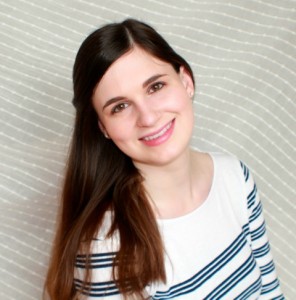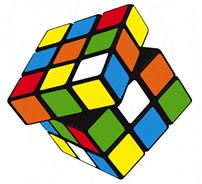Blair Daniel likens her dyslexia to a Rubik's Cube. A long-time Learning Ally member, she shares a candid account of her dyslexia journey and describes how tools like audiobooks have helped her find success as a student at Wellesley College.
---------------------------------------------------------------------------------

A Rubik's Cube, the classic puzzle, seems impossible to solve at first. You sit and agonize for hours. Maybe you solve one side, but the others remain a mystery, mocking you with their complexity. You think to yourself, “How can anyone solve this puzzle?” Not long ago, I thought this. Then I was given the tools to solve a Rubik’s Cube, and I learned that there are seven algorithms that can be used. Now I can solve one in ninety seconds.
So what does a Rubik's Cube have to do with Learning Ally?
Dyslexia, like a Rubik's Cube, is a puzzle. It feels complicated and unsolvable at first, but when you are given the right tools, it can be solved.
Reading never came easily to me. By the second grade, I had become so frustrated trying to solve the reading “puzzle” that I resolutely declared to my parents that I was never going to read. When we sat down with a book I wouldn’t even look at the page. By the third grade we had figured out why I felt this way: Dyslexia.
Though my problem now had a name, we didn’t have all the answers, and despite hours of practice and work each night in addition to my homework, I still struggled through every page. I was informed that everything was going to take longer for me, but that with effort and strategy I could still learn and even excel. I knew that while my peers spent little time on assignments, I would need to devote hours to the same work, and while my friends enjoyed recess some days, I would need to stay inside to complete a test. This was no excuse not to try.
Through elementary school I developed a strong work ethic in response to the challenges I faced. Then, starting in sixth grade, I could listen to all of the books for my homework assignments through Learning Ally. Although little of my homework involved textbooks at that point, the novels recorded by Learning Ally allowed my love of stories to grow stronger than my fear of reading. In addition, I used both Earobics and Fast ForWord, two computer programs that improve students' reading abilities, to help me reach grade-level reading skills. I was able to work with both of these programs because of the support given to me by my parents, friends, and community.

By middle school I had gained confidence as a student and wouldn’t let anything get in my way. Due to the academically rigorous nature of my school, hard work was not the only tool I needed. I began to use Learning Ally even more, listening to recordings of my textbooks in addition to novels. This allowed me to complete assignments more efficiently and improved my comprehension and recall of the material.
As the student leader of the Drama Club and a varsity athlete in two sports I stretched myself very thin. There were many late nights finishing my homework assignments after spending time on extracurricular activities. I had to give up many weekends staying ahead on homework instead of spending time with my friends. I gained time management skills in order to cope with a demanding schedule.
I also learned that I had to speak up in order to keep up -- advocating for myself by asking for assignments (particularly reading) to be given in advance so that I could balance work and other commitments by sometimes working ahead. It was up to me to make sure that my teachers understood my needs and accommodations. By being a self-advocate, I continued to solve the puzzle that is school.
I've just completed my first year at Wellesley College and have used Learning Ally more than ever: not only to keep up with my academics, but also to enjoy some current novels while walking around campus. The app I use the most on my iPod Touch is the Learning Ally Audio application. Learning Ally has each of my textbooks recorded, even in specific subjects like Neuroscience. There are still challenges, like finding quiet places to listen or asking friends to leave my room so that I can complete assignments, but I have all of my tools to solve the puzzle.
Being dyslexic has not been easy, but it has given me tools to solve problems and develop solutions to challenges. Dyslexia means looking at the world from a different angle. I think it is because of my Dyslexia, and visual/spatial cognitive abilities that I have learned how to solve a Rubik's Cube. What once looked impossible, now looks like a puzzle I can solve with tools like Learning Ally. Dyslexia is not something that stands in the way of you achieving your dreams; only you can do that. I believe that, with the right tools, you too can solve the puzzle in front of you.
-Blair Daniel